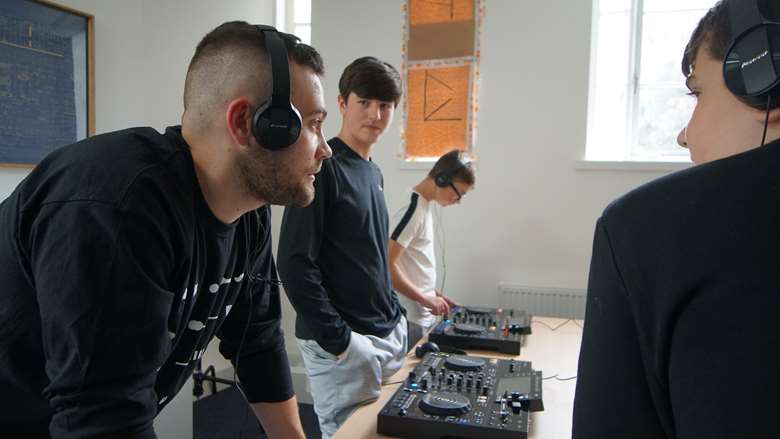All hands on deck: FutureDJs
Samara Ginsberg
Saturday, May 1, 2021
Brothers Austen and Scott Smart have made it their mission to widen the gateway to music education using a set of DJ decks. Samara Ginsberg catches up with them to find out what FutureDJs can add to the mix.

Once a feature of nightclubs rather than school music departments, DJ decks have become increasingly popular in schools, catalysed by their recognition by GCSE exam boards AQA, OCR and Eduqas in 2016. Providing a broad as possible range of musical experiences is not an ethos many heads of music would disagree with, but DJ decks are out of the comfort zone of many. FutureDJs, founded in 2016 by brothers Austen and Scott Smart, aims to demystify DJing by providing tutors, equipment and continuing professional development.
Austen Smart believes it's vital that the curriculum aligns with students’ interests: ‘The numbers of students taking GCSE music decline year on year. Something has to be done to correct that and make the syllabus in line with what young people actually listen to.’
Striving to reflect youth culture could run the risk of undermining one of the purposes of music education – to widen students’ musical experience – but Smart says that decks often spark an organic interest in studying broader topics: ‘You're getting students into the music department who would not have gone in there before. Once they're in there you can go from DJing to production, then to writing music on a piano, then say, “Oh, you liked that bass line? That's been going on for hundreds of years. Purcell was doing this bass line.” It can really broaden a student – it opens the doors, and it makes it accessible.’
Inclusive approach
This view is echoed by James Manwaring, head of music at The Windsor Boys’ School, whose pupils have been studying with FutureDJs tutors for three years: ‘We've engaged a slightly different demographic and cohort of boys. If you can engage a student in one aspect of music, then you can introduce them to another more easily. That's important for schools, to find the thing that will engage the student, get them excited and interested and hook them into it.’
Sparking so many musical interests from one set of decks sounds like a tantalising prospect, but with budgets often tight, the idea of spending thousands of pounds on DJ equipment might seem horrifying. The Smart brothers have been able to capitalise on an existing relationship with Pioneer Decks to provide equipment for free, enabling schools to provide tuition without any initial outlay: ‘We could see that there were these barriers to inclusive music education. We had a sponsorship deal as artists with Pioneer Decks, so we asked them, and every year they pledge a huge number of decks. We put them into schools for free and schools then pay for lessons just like you would with instrumental lessons.’
With the emphasis on inclusivity and the infrastructure to provide free equipment, FutureDJs ought to be a particularly attractive prospect for underfunded schools. However, independent schools currently make up around 30 per cent of their client base – an overrepresentation, yet one that Smart is keen to increase: ‘We would like to teach in more independent schools. I would say that the barriers are higher to get into them. There's more governance in private schools, which is not a bad thing, it just takes more time. But some of our very best students have come from some of our private schools.’
‘Soft’ option?
FutureDJs is helping teachers hone their knowledge with CPD webinars, as well as music production resources. Manwaring has been impressed: ‘As a music teacher, you have to be aware of all genres that you can draw upon, and you have to be prepared to learn. Their music production stuff is fantastic – if schools have got computers and internet access then they can engage. They're offering the whole package. You don't have to worry about becoming an expert.’
Some more conservative educators might question whether decks really do require as much skill as other instruments. Smart's response is simply to invite teachers to try it: ‘I remember once being at Canford School, we got a number of teachers to come up and have a go and the response was, “Okay, this is really hard! This is challenging in its own ways, and I can see that this will take me a long time and a lot of practice.”

